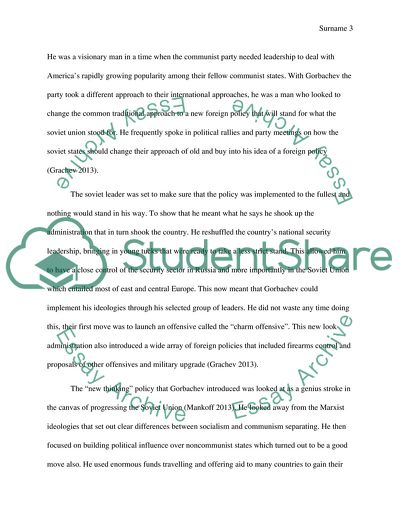Cite this document
(Gorbachev's Foreign Policy Essay Example | Topics and Well Written Essays - 2250 words, n.d.)
Gorbachev's Foreign Policy Essay Example | Topics and Well Written Essays - 2250 words. https://studentshare.org/history/1864442-5-what-was-gorbachevs-foreign-policy-towards-the-states-of-central-and-eastern-europe-and-how-successfully-were-these-achieved-by-1989
Gorbachev's Foreign Policy Essay Example | Topics and Well Written Essays - 2250 words. https://studentshare.org/history/1864442-5-what-was-gorbachevs-foreign-policy-towards-the-states-of-central-and-eastern-europe-and-how-successfully-were-these-achieved-by-1989
(Gorbachev'S Foreign Policy Essay Example | Topics and Well Written Essays - 2250 Words)
Gorbachev'S Foreign Policy Essay Example | Topics and Well Written Essays - 2250 Words. https://studentshare.org/history/1864442-5-what-was-gorbachevs-foreign-policy-towards-the-states-of-central-and-eastern-europe-and-how-successfully-were-these-achieved-by-1989.
Gorbachev'S Foreign Policy Essay Example | Topics and Well Written Essays - 2250 Words. https://studentshare.org/history/1864442-5-what-was-gorbachevs-foreign-policy-towards-the-states-of-central-and-eastern-europe-and-how-successfully-were-these-achieved-by-1989.
“Gorbachev'S Foreign Policy Essay Example | Topics and Well Written Essays - 2250 Words”. https://studentshare.org/history/1864442-5-what-was-gorbachevs-foreign-policy-towards-the-states-of-central-and-eastern-europe-and-how-successfully-were-these-achieved-by-1989.


